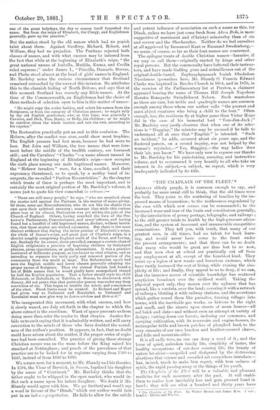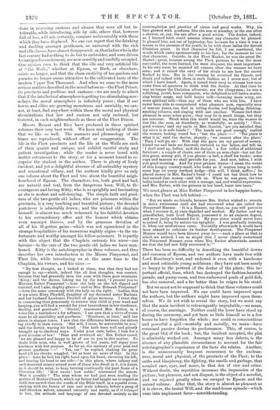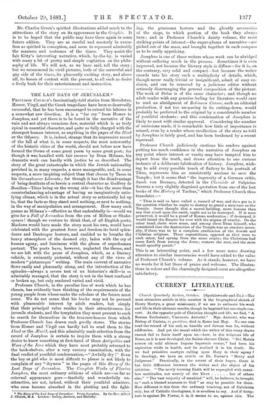"THE CHAPLAIN OF THE FLEET."* AUONGsT elderly people, it is
common enough to say, and probably far more usual still to think, that the old times were the best. They point to the scattering of families by the im- proved means of locomotion ; to the restlessness engendered by the ease with which new scenes can be commanded ; to the increased wear-and-tear of the brain and constitution generally, by the introduetiou of penny postage, telegraphs, and railways ; to the still greater trials to health by the high-pressure educa- tion, and the system of incessant and innumerable competitive examinations. They tell you, with truth, that many of our greatest men, in old times, had no talent for book learn- ing, and would never have come to the front under the present arrangements ; and that there can be no doubt that many who would be great are thus lost to us now,. and that men slow at school are practically cut off from any employment at all, except of the humblest kind. They count up a legion of new wants and luxurious customs, which, have vastly increased the cost of living, while ruining the sim-
plicity of life ; and finally, they appeal to us to deny, if we can,
that the immense access of scientific knowledge has scattered scepticism broadcast over the civilised world. Taking the physical aspect only, they mourn over the ugliness that has spread, like a scrofula, over the land ; covering it witha network of railways, blotting it with railway stations, and the accretions which gather round them like parasites, turning villages into towns, with the inevitable gas works, so hideous to the sight and smell, and the streets upon streets of mean houses—all red brick and slate—and without even an attempt at variety of
design ; cutting down our forests, inelosing our commons, and carrying cultivation, with its reservoirs and engine-houses, its
rectangular fields and brown patches of ploughed land, to the very summits of our once bracken and heather-covered chases, and fells and mountain-sides.
It is all sadly tree, no one can deny a word of it ; and the lover of quiet, unbroken family life, simplicity of tastes, the healthy occupations of out-door country life, the beauty of nature let-alone—unspoiled and disfigured by the distressing abortions that science and so-called art everywhere introduce— has, indeed, much to make him regret, with true sadness of spirit, the rapid passing-away of the things of his youth.
The Chaplain, of the Fleet will be a valuable and pleasant medicine for such mourners after the past. It will enable them to realise how inevitably loss and gain proceed hand in hand ; they will see what a hundred and thirty years have • The Cho plain of the Feel. By Walter Benutt and James Wee. 3 vols.. London ; Chairs" and Win Ins. done in removing customs and abuses that were all but in- tolerable, while introducing, side by side, others that, however full of loss, will not, certainly, compare unfavourably with those -which they have displaced. No one can regret that the drinking and duelling amongst gentlemen, so universal with the rich and idle classes, have almost disappeared; or, that ladies who in the last century had nothing to do but to embroider, and were driven to intrigue for excitement, are now sensibly and usefully occupied.
(One rejoices even to think that the idle and very artificial life of "the Wells," whether at Epsom, or Bath, or elsewhere, exists no longer, and that the sham rusticity of tea-gardens and parades no longer seems attractive to the cultivated taste of the modern Upper Ten Thousand. And when we come to the more -serious matters described in the novel before us—the Fleet Prison, its precincts and purlieus and customs—we are ready to admit that if the intellectual atmosphere is getting too stimulating now- a-days, the moral atmosphere is infinitely purer ; that if our towns and cities are growing monstrous and unwieldy, we can- not, at least, find anywhere within them the moral and physical abominations that law and custom not only endured, but fostered, in such neighbourhoods as those of the Fleet Prison.
Messrs. Besant and Rice have produced in these spirited volumes their very best work. We have read nothing of theirs that we like so well. The manners and phraseology of old times are reproduced, without effort or exaggeration. The life in the Fleet precincts and the life at the Wells are each of them quaint and unique, and exhibit careful study and patient investigation ; while the reader is never bored with matter extraneous to the story, or for a moment forced to re- .cognise the student in the author. There is plenty of lively incident, and yet a delightful absence of all unhealthy mystery and sensational villany, and the authors kindly give us only one volume about the Fleet and two about the beautiful neigh- bourhood of Epsom. The characters, too, both good and bad, are natural and real, from the dangerous boor, Will, to the courageous and loving Kitty, who is as sprightly and fascinating .as she is modest and self-denying. The simple faith and good- ness of the two gentle old ladies, who are prisoners within the precincts, is a very touching and beautiful picture ; the devoted poet-lover is admirably drawn ; and the wicked old chaplain !himself, is almost too much redeemed by his faithful devotion to his extraordinary office and the honour which obtains even amongst thieves, and by the generous devotion of all of his ill-gotten gains—which was not squandered in the strange hospitalities of his numerous nightly orgies—to the un- fortunate and worthy amongst his fellow-prisoners. It is partly with this object that the Chaplain entrusts his niece—our heroine—to the care of the two gentle old ladies we have men- tioned. Kitty is the autobiographer in these volumes, and thus describes her own introduction to the Misses Pimpernel, and Fleet life, while introducing us at the same time to the Chaplain, his virtues, and his vices :—
"My first thought, as I looked at them, was that they had not enough to eat—which, indeed like all first thoughts, was correct, because that had generally been the case with these poor creatures. Bitty,' said the doctor, taking me by the hand, I present you to Mistress Esther Pimpernel '—here the lady on the left dipped and curtsied, and I also, mighty grave= and to Mrs. Deborah Pimpernel' —here the same ceremony with the lady on the right. Ladies, this is my niece Kitty Pleydell, daughter of my deceased sister Barbara and her husband Lawrence Pleydell of pious memory. I trust that in consenting thus generously to receive this child in your ward and keeping, you will find a reward for your benevolence in her obedience, docility, and gratitude." Doctor,' murmured Mrs. Esther, in a voice like a turtledove's for softness. I am sure that a niece of yours must be all sensibility and goodness." Goodness, at least,' said her sister, in sharper tones. I saw that the difference between the sisters lay chiefly in their voices. 'She will, I trust, be serviceable to you,' said the doctor, waving his hand. She hath been well and piously brought up to obedient ways. Under your care, ladies, I look for a good account of her." Dear and reverend sir,' Mrs. Esther cooed, 'We are pleased and happy to be of use to you in this matter. No doubt little miss, who is well grown of her years, will repay your kindness with her prayers. As for us, the memory of your past and present goodness—' Tut, tut !' he replied, shaking his great head till his cheeks waggled, let us hear no more of that. In this place '—here he laid his right hand upon his heart, elevating his left, and leaning his head to one side—' in this place, where infamy and well-deserved misery attend most of those who dwell in it, it is yours, as it should be mine, to keep burning continually the pure flame of a Christian life.' 'How sweet ! how noble !' murmured the sisters. Was it possible ? The man whom we had just seen reading the service of Mother Church, which any father had taught me to regard as little less sacred than the words of the Bible itself, in a squalid room, reeking with the fumes of rum and stale tobacco, before a gang of half-drunken sailors, assumed naturally and easily, as if it belonged to him, the attitude and language of one devoted entirely to the contemplation and practice of virtue and good works. Why, his face glowed with goodness like the sun at noonday, or the sun after a shower, or, say, the sun after a good action. The doctor, indeed, as I learned later, could assume almost any character he pleased. It pleased him, not out of hypocrisy, but because for a time it was a return to the promise of his youth, to be with these ladies the devout Christian priest. In that character he felt, I am convinced, the words which came spontaneously to his lips ; for the moment he was that character. Outside, in the Fleet Market, he was the great Dr. Shovel—great, because among the Fleet parsons he was the most successful, the most learned, the most eloquent, the most important. In his own room he married all corners, after the manner we have seen ; and it raised the envy of his rivals to see how the crowd flocked to him. But in the evening he received his friends, and drank and talked with them in such fashion as I never saw, but of which I have heard. Again, it raised their envy to witness how men came from all quarters to drink with the doctor. At that time he was no longer the Christian advocate, nor the clergyman; he was a rollicking, jovial, boon companion, who delighted to tell better stories, sing better songs, and hold better talk—meaning more witty, not more spiritual talk—than any of those who sat with him. I have never been able to comprehend what pleasure men, especially men of mature years, can find in telling stories, and laughing, drinking, smoking tobacco, and singing with one another. Women find their pleasure in more sober guise ; they may lie in small things, but they are innocent. Think what this world would be, were the women to live like the men, as disorderly, as wastefully, as noisily ! 'Now, good woman,' said my uncle to Mrs. Gambit, are you satisfied that my niece is in safe hands?' ' The hands are good enough,' replied the woman, looking round her ; but the place—' 'The place is what it is,' said the doctor, sharply ; we cannot alter the place.' Then I will go, sir.' With that she gave me my parcel of money, kissed me and bade me farewell, curtsied to the ladies, and left us. 'I shall send up, ladies,' said the doctor, a few trifles of additional furniture ; a couple of chairs, one of them an arm-chair—but not for this great, strong girl, if you please—a bed, a shelf for books; some cups and saucers we shall provide for you. And now, ladies, I wish you good-morning. And for your present wants—I mean the wants of this hungry country-maid, who looks as if mutton hung in tooth- some legs on every verdant hedge—this will, I think, suffice ;' he placed money in Mrs. Esther's hand—I could not but think how he had earned that money—and left us. When he was gone, the two ladies looked at each other with a strange, sad, and wistful expression, and Mrs. Esther, with the guineas in her hand, burst into tears."
We must glance at Miss Esther Pimpernel in her happier hours, when the Fleet was left behind :—
"But we made no friends, because Mrs. Esther wished to remain in strict retirement until she had recovered what she called the Pimpernel Manner. It is a Manner, any dear, as you will perceive when I recover it, at once dignified and modest. My father and my grandfather, both Lord Mayors, possessed it to an eminent degree, and were justly celebrated for it. My poor sister would never have acquired it, being by nature too sprightly. I was gradually learning it, when our misfortunes came. Naturally afterwards it would have been absurd to cultivate its further development. The Pimpernel Manner would have been thrown away in—such a place as that to which we retired, I am so stupid that I never clearly understood the Pimpernel Manner, even when Mrs. Esther afterwards assured me that she had now fully recovered it.'"
There has been no difficulty in describing the beautiful downs and common of Epsom, and our authors have made free with Lord Rosebery's seat, and endowed it even with a handsome and most estimable young nobleman ; they have not been nearly so happy in the portrait of the doctor of the place ; this im- portant official, time, which has destroyed the fashion-haunted parade, and pump-room, and tree-embowered pools of gold-fish, has also removed, and a far better than he reigns in his stead.
But we must not be supposed to think that these volumes could not have been improved. No one could have improved upon the authors, but the authors might have improved upon them- selves. We do not wish to reveal the story, but we must say that the main incident is extravagantly improbable,—we mean, of course, the marriage. Neither could the lover have stood up during the ceremony, and yet been so little himself as in a few hours to have forgotten the whole ; nor could so conscientious and powerful a girl—mentally and morally, we mean—have remained passive during its performance. This, of course, is the great blot of the book ; but, the incident accepted, the plot is admirably worked out. Amongst many less defects, is the absence of any plausible circumstance to account for the fair autobiographer's cognisance of the facts she relates. Another, is the unnecessarily frequent recurrence to the unclean- ness, moral and physical, of the precincts of the Fleet; to the oaths and blasphemy, the fighting, the smells and garbage, that assailed ears, eyes, and noses, in that den of vice and crime. Without doubt, the repetition increases the impression of the picture ; but pleasure, and not disgust, is the object of a novelist, and we rejoiced greatly when we escaped to Epsom and the second volume. After that, the story is almost as pleasant as it is clever, the brutal Will, and the mad-house episode—which runs into unpleasant farce—notwithstanding. Mr. Charles Green's spirited illustrations added much to the attractions of the story on its appearance in the Graphic. It is to be hoped that the public may have them again in some future edition. They are as careful and masterly in execu- tion as spirited in conception, and seem to represent admirably the manners and costumes of the times. They assist the fair Kitty's interesting narrative, which, by-the-by, is varied with many a bit of pretty and simple cogitation on the philo- sophy of life. We will not, as we have said, tell the story ; but we recommend its vivid pictures, both of the sorrowful and gay side of the times, its pleasantly exciting story, and above all, its lesson of content with the present, to all such as desire a lively book for their entertainment and instruction.




































 Previous page
Previous page